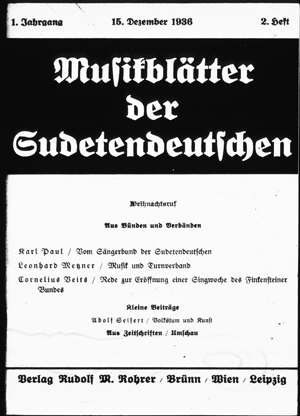Musikblätter der Sudetendeutschen
Prepared by Ole Hass
Online only (2017)

The German-language journal Musikblätter der Sudetendeutschen [Music journal of the Sudeten Germans, RIPM code MBS] was published in Brno (Brünn in German), the second-largest city after Prague in Czechoslovakia (now the Czech Republic). The journal appeared in two volumes of twelve issues, each containing thirty to thirty-six pages, from 15 November 1936 to 15 December 1938. After otherwise monthly publication, a double issue (volume two, number nine/ten) is dated June 1938, followed by a September and then the December issue.
The Sudetes are a mountain range stretching from Germany to Poland and the Czech Republic; however, especially after World War I, the term “Sudetendeutschen” was often used to describe all ethnic Germans in Czechoslovakia, including those in Bohemia and Moravia, for the most part by those who wanted autonomy of these areas. By the year 1937, the activities of the Sudetendeutsche Partei (SdP) of Konrad Henlein, the political party behind these endeavors, was very much controlled by the German Nazi party, the Deutsche Nationalsozialistische Arbeiterpartei (NSDAP). Hugo Kinzel, the editor of MBS, was cultural attaché for the SdP. The journal starts out with the stated mission to unify the musical activities of the Sudetendeutschen and ceases publication with the December issue 1938, containing only one essay by Kinzel: “Unsere Sendung ist erfüllt, unser Ziel erreicht” [Our mission is fulfilled, our goal is reached], after parts of Czechoslovakia were annexed by Germany.
Everything in this journal should be read in the light of above explanations; polemics and illogical refutations can be found in many places. However, the journal also covers musical life of these areas, including local music institutions, first performances, folk music and, maybe most of all, the growing movements of dilettante choral singing. Treatment of MBS by RIPM can also be justified as an addendum to the preceding treatment of the Prague modern music journal, Auftakt (1920-1937).
The layout of the issues is consistent: Opening articles are followed by the columns “Aus Zeitschriften” [From other journals], “Wir besprechen” [Our reviews] and “Umschau” [Overview], a column for performance reviews and miscellaneous news.
A number of issues begin with biographical sketches and photographs of important local composers, including Felix Petyrek, Ludwig Weber, Fidelio F. Finke, Bruno Weigl, Anton Tomaschek, Hans Feiertag, Theodor Veidl, Ernst Richter, Alfred Domansky, Johannes Bammer, Egon Kornauth, Josef Wizina (autobiographical), Isidor Stögbauer and Franz Schmidt. Coverage of local folk music includes two articles on the fiddle and folk music and on a visit to the cabinet maker and fiddle builder family Bernesch around Jihlava (Iglau), on southern Slavic folk music, an overview of music making in Transylvania (Siebenbürgen), and an extensive overview of the Sudeten German folk song by the important folk song expert Walther Hensel. Many articles deal with the burgeoning and reorganization of dilettante musical life, inspired by the Finkensteiner movement and “Singwochen” [singing weeks] of Hensel, which were soon to be incorporated into the activities of the Hitler-Youth and other organizations.
The reflections on other journals focus on polemics against the Czech press and favorable coverage of the German press, notably the Musik in Jugend und Volk. The column entries in volume two, number seven are good examples of MBS’s mission against Auftakt and and elements of Jazz. The review section treats for the most part writings on music and printed music for the dilettante and the pedagogue, many of them from the publishers Kallmeyer and Bärenreiter. Outside of the column appear Eduard Frank’s reviews of music-themed novels (three installments). It seems ironic that compositions by Theodor Veidl, who assisted Erich Steinhard as editor of Auftakt, were positively received in MBS throughout its run; in a review of Steinhard’s Die Musik in der Tschechoslowakischen Republik [Music in the Czechoslovakian Republic], editor Kinzel gives credit for the demise of Auftakt to the board of the Musikpädagogischer Verein [Association for music pedagogy, the initiator of Auftakt]; both Steinhard and Veidl were later deported.
The “Umschau” surveys musical life in places such as Prague, Brno, Teplice (Teplitz-Schönau), Karlovy Vary (Karlsbad), Cheb (Eger), Most (Brüx) and Ústí nad Labem (Aussig). The contributions about Prague center on the German University Collegium musicum’s early music performances under the direction of Gustav Becking, but also include the occasional stab at performances of modern music, for example in comments on music by Hanns Eisler and quartertone composer Alois Hába in a concert of “soviet choral compositions”. Starting with volume two, issue eight (June 1938), the section is subdivided into German, non-German foreign, Czech and Sudeten German musical life. The reports from Germany include coverage of the “Reichsmusiktage”, the Reich’s music festival in Düsseldorf 1938, with the exhibit “Entartete Kunst” [Degenerate art].
A Sudetendeutsches Musikfest [Sudeten German music festival] is postponed several times (apparently because of resistance from the Czechoslovakian government) before its first celebration in September of 1937 in Teplice (Teplitz-Schönau), including an exhibit on Franz Schubert’s ancestors in Bohemia and a Heinrich Schütz-festival by the Sudeten youth. The May 1938 issue is dedicated to the second festival that month in the same location; a third festival is announced to occur in September of 1938 but is not covered in the journal.
A supplement, the music collection Männerweisen, was edited by Erich Sedlatschek, who also contributed a number of essays to MBS. This copy of MBS only contains the first double issue of the supplement, which includes nineteen songs, canons and choruses on comradery, friendship and fatherland by Sedlatschek, Karl Michael Komma and others, as well as two instrumental pieces by Walther Cittor and Hans Heinz Brandt.
